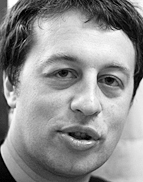 Konstantin Sonin
Konstantin SoninSeveral years from now, when we look back at the major events of 2013, perhaps the most important will have been anti-corruption blogger Alexei Navalny's announcement that he plans to run for president.
The next presidential election is slated for 2018, but the legitimacy of the current regime is so low that there is a decent chance of an early election being called. But even if the next president is chosen a full five years from now, Navalny's announcement does not seem premature. Any candidate with serious hopes of winning will need plenty of time to prepare if the elections are truly competitive.
According to the latest poll by the Levada Center, an increasing number of people have heard of Navalny, making him perhaps the county's most popular opposition leader. In recent years, he has managed to put in place mechanisms monitoring corruption and the ineffectiveness of state agencies, turning him into a formidable force for change. In one example, Navalny's disclosures pressured the authorities to cancel a tender for luxury-class automobiles and other high-priced items for state officials, thereby saving millions of rubles of taxpayers' money. But in assessing Navalny's influence, we should also count all of the useless tenders that were never held and all of the money that was never stolen because officials were afraid of seeing their names in Navalny's anti-corruption blog.
But Navalny's main problem now is not securing an electoral win but fighting political opponents who have the country's powerful administrative and punitive resources at their disposal. To emerge victorious in that battle, Navalny would need to have heavier backing than a simple list of people willing to vote for him in a presidential race.
There are many reasons why the anti-Navalny campaign spearheaded by the Investigative Committee is wrong. Aside from the obvious fact that threatening to jail someone on trumped-up charges is itself a criminal offense, the government's case against Navalny diverts enormous human and material resources from the more pressing fight against crime and corruption.
Even more important, any attempt to limit political competition does direct harm to the country and its citizens. Imagine if MTS, one of the largest mobile phone operators in the country, managed to shut down its largest competitors: Beeline and Megafon. It would have negative repercussions not only for subscribers to Beeline and Megafon, but also for MTS customers. As a monopoly, MTS would soon offer lower-quality services at higher prices than before. The same thing would happen if Pepsi managed to drive every other soft drink maker out of the market. Politics differs little from business in this respect; in both cases, monopoly control has a highly corrosive impact. In a country like Russia that limits opportunities for political competition, the cost for government services rises while the quality of those services declines.
I don't know if I would vote for Navalny in the next presidential election. Before deciding, I would need to study the alternatives. But either way, Navalny has the right to participate in a free and fair election. If he is found guilty in a rigged trial, he would be prohibited by law from running for public office, even if he only receives a suspended sentence. By denying Navalny the right to run for president, the Kremlin is also denying my rights as a voter and citizen.
Konstantin Sonin is a professor at the New Economic School in Moscow and a columnist for Vedomosti.
A Message from The Moscow Times:
Dear readers,
We are facing unprecedented challenges. Russia's Prosecutor General's Office has designated The Moscow Times as an "undesirable" organization, criminalizing our work and putting our staff at risk of prosecution. This follows our earlier unjust labeling as a "foreign agent."
These actions are direct attempts to silence independent journalism in Russia. The authorities claim our work "discredits the decisions of the Russian leadership." We see things differently: we strive to provide accurate, unbiased reporting on Russia.
We, the journalists of The Moscow Times, refuse to be silenced. But to continue our work, we need your help.
Your support, no matter how small, makes a world of difference. If you can, please support us monthly starting from just $2. It's quick to set up, and every contribution makes a significant impact.
By supporting The Moscow Times, you're defending open, independent journalism in the face of repression. Thank you for standing with us.
Remind me later.





